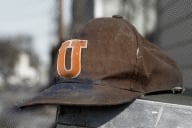You have /5 articles left.
Sign up for a free account or log in.
The Undoing Project: A Friendship That Changed Our Minds by Michael Lewis
Published in December of 2016.
Saying that The Undoing Project is my favorite Michael Lewis book is saying a lot.
Everything that Lewis seems to write somehow ends up being important. The trilogy of Liar’s Poker, The Big Short, and Flash Boys helped us all to understand the causes and consequences of the financialization of the U.S. economy. Blame Moneyball, at least in part, for both the positive and negative consequences of our current obsession with analytics in higher ed. And The Blind Side is a football book beloved by sociologists throughout the land.
The Undoing Project is my favorite Lewis book because it is an unashamed love letter to the intellectual process of discovery. This is a book that captures why so many of us went fell in love with ideas, went to grad school, and have tried (with mixed success) to navigate this ridiculous industry that we call higher education.
The story of how new ideas are discovered is told through the intellectual partnership of Daniel Kahneman and Amos Tversky. You may not know it, but if you are aware of the systematic limitations of your own decision makers powers, than you owe this awareness (at least in part) to the research of Kahneman and Tversky.
We are all a little bit sure of ourselves, and a little bit more aware of how easily our thinking can become muddled, thanks to the discoveries of Kahneman and Tversky.
Those of us in the edtech business who wish that our community might be less enthusiastic about the ability of technology to improve learning also owe (in part) our reticence to the findings of Kahneman and Tversky.
Milton Friedman once said that, "We are all Keynesians now” - which I hope is still true. We are also all followers now of Kahneman and Tversky.
The idea that we are rational actors, evolved to make decision based solely on maximizing our expected utility, is no longer thought to be credible within or without of the economics profession.
The fields of behavioral economics and economic psychology owe much of their founding to the work of Kahneman and Tversky. No academic discipline - and here I’m including the emerging discipline of learning technology - has been left unaffected by the core ideas of Kahneman and Tversky.
The late Amos Tversky once said that "A part of good science is to see what everyone else can see but think what no one else has ever said.” Lewis takes that Tversky quote to build the story of how the relationship between these Israeli (and then American) academics enabled them to think what no one else has ever said.
This is a beautiful and at time heartbreaking book. I know of no other book that so well captures the joys of academic collaboration, as well as the personal pain that often accompanies the most important of intellectual breakthroughs.
If you are worried that too many people go to grad school to get a PhD then you will want to keep The Undoing Project out of the hands of undergraduates.
This year’s best book about higher education - and maybe one of our best books about ideas and the people who create them - is The Undoing Project.
What are you reading?








